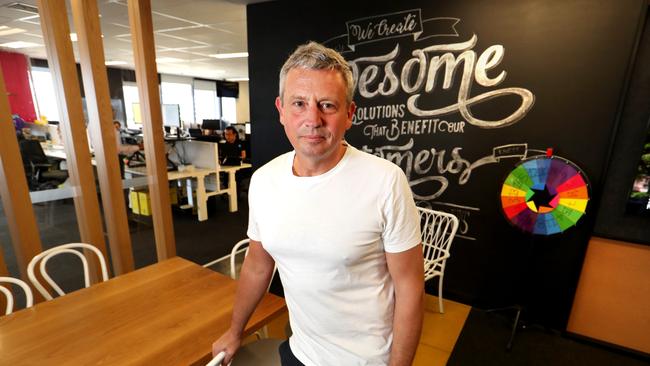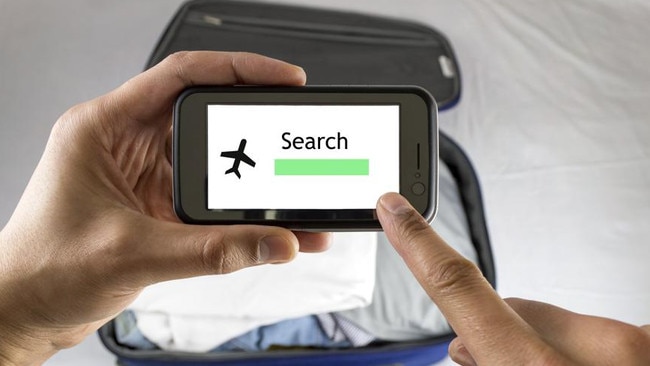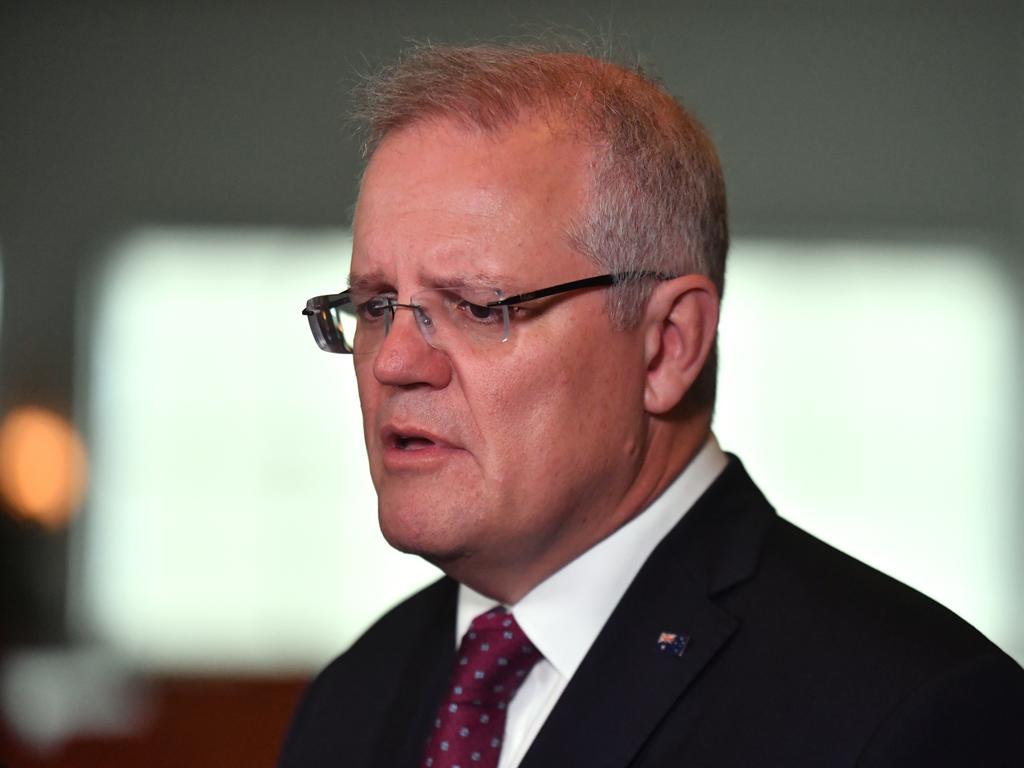Aussie fintech flourishes in $2.5bn US deal
Meet the Australian start-up you’ve never heard of, but whose technology you would have almost certainly used.

Meet the $2.5bn Australian fintech start-up you’ve never heard of, but whose technology you would have almost certainly used whenever you have paid online for a flight or hotel room with a credit card.
Melbourne-based eNett is, as founder Anthony Hynes jokes, “a 19-year overnight success story” that has barely received any publicity in its home country even after it and sister company Optal were sold for $US1.7bn ($2.53bn) to the New York Stock Exchange-listed WEX only three weeks ago.
ENett and Optal, which Hynes started after selling a childcare business to colourful entrepreneur Eddy Groves and his ABC Learning Centres in his 20s, will merge as part of the deal.
WEX is particularly keen on eNett’s virtual account number (VAN) technology, which sits behind the business-to-business transactions that take place on the world’s biggest travel booking websites. The deal gives WEX, mostly known for its payments systems for corporate and government car fleets, a bigger presence in the travel industry.
Hynes’ technology generates a virtual number that is embedded in the travel booking process, allowing an instant payment by the consumer, instant acceptance by the booking website and instant payment to the supplier, such as a hotel or airline. It has helped transform the back operations travel sector, which only 15 years ago was using paper-based payment voucher and reconciliation systems.
Based on the terms of the WEX deal, which was announced on January 24 and is expected to be finalised mid-year, eNett and Optal are forecast to have had estimated combined EBITDA of about $US100m this year, just about all from overseas. Their technology helped process about $US20bn worth of travel booking payments last year and they have eight of the top 10 global travel sites — the likes of Booking.com and Trip.com — as clients.
In his first major interview, Hynes tells The Weekend Australian that while about 200 of his company’s 360 staff are based in Australia, any local presence is dwarfed by the company’s scale on the global stage — which is why he has mostly escaped the limelight.
“People have been saying when we’re done we’ve got to tell the world about this, because most people never heard of us,” he says with a grin in the firm’s Melbourne head office.
“We were quite happy doing what we were doing without spruiking ourselves. People in the travel industry probably know us and people in the payments industry would know us. But we are not a consumer business. And Australia is probably about 0.1 per cent of our business, or something like that — less than 1 per cent anyway. Australia is the foundation of our business, but it is a small part of our business.”
Like most entrepreneurial journeys, it has not always been plain sailing for Hynes. His business almost collapsed after trying to establish a $800m finance company in Singapore on the eve of the global financial crisis. It was bought and sold by private equity. And a simple-sounding change in strategy helped catapult revenue from a few million dollars annually to hundreds of millions within a few years.
Hynes started his business career in his last year at Deakin University, where he undertook a commerce degree while juggling working in pubs 70 hours a week. His mother worked in childcare and that year she took a job at the old accounting firm Coopers & Lybrand, which had become administrators of a centre in Melbourne’s Mont Albert.
“They had no idea, so they sent mum in to run it,” says Hynes. “I spent most of my last year at university planning on how we could take the business over and I finished uni on the Wednesday and started with mum on the Thursday.
“I did that with my mum and sister for about three years. We grew the business 600 per cent and in the end we sold it to ABC Learning Centres. We were their first external acquisition before its (ASX) listing. I did spend a bit of time with Eddy (Groves). That was entertaining!”

After that sale, Hynes went back to university, eventually undertaking an MBA at Swinburne University while he contemplated what to do next. In a class of mostly international students, he made long-term friendships including one classmate from India he has since visited 27 times. Hynes says the first of those trips opened his eyes to a world beyond Australia.
“In 2000 I met a guy on my travels who had some encryption technology. I didn’t know much about technology at the time, and I think it is safe to say I still don’t know a lot about technology. But it sounded interesting and we developed this concept about making payments on your mobile phone using a PIN number. We were probably ahead of our time there. And then, almost by accident, I fell into an opportunity in the travel industry.”
Hynes was asked to try to computerise the outdated booking and payment systems being used by the Flagchoice Hotel Group, which had a string of hotels and motels under the Flag brand. He could not believe what he found.
Flagchoice used a colour-coded paper-based system. They would send paper via the mail to wholesalers, who would sell hotel rooms to travel agents. They in turn would give paper vouchers to travellers to hand over to the hotel when they arrived.
The hotel franchisee would then send the voucher in the mail to Flagchoice headquarters, where one employee would sort them and instruct the finance department to send the money and invoice the wholesaler.
“It sounds crazy in today’s world and I thought it sounded crazy back then,” says Hynes. “You’re paying the franchisee, as you should, when they send the voucher in. But the wholesaler isn’t paying you for nine months. So you’ve got nine months negative cashflow on a very low single-digit margin business. I remember feeling a mix of incredulousness and amazed that adult people would allow this to happen.
“We walked away from that project and thought ‘I’ve just got to get on planes and go find an electronic payments system for the travel industry’.”
There was one in use from Sydney, on old green screens using the MS-DOS operating system, but money would take three or four days to clear and there was a disconnect between the booking and ticket arrival.
Hynes formed eNett and built a direct debit and direct credit clearing house system, raising about $880,000 from a friend of a friend in Britain in 2002 to keep growing. Further growth came when Qantas stopped paying travel agent commissions in 2006, which meant helping the agents automate the adding of a service fee when travellers booked.
He would then take a bold decision to form a finance company in Singapore in 2007, to help facilitate the flow of transactions that eNett was starting to process for the travel industry — but the timing would prove almost fatal.
“I had no experience in setting up finance companies and we managed to get a couple of banks to play the game with us for the tune of about $800m. So we went to Singapore for the signing ceremony and as I walked in they were in the process of tearing up the documents. This was the first sign of the GFC.
“It was a devastating day but we’ve had some of those days. I think my contribution to this business has been to say it is done and let’s move on. There is nothing wrong with making mistakes — you just have to wade your way through things.”
Hynes and his team licked their wounds and forged ahead with their clearing house system, though it became apparent it would be hard to scale it into something globally significant. Then came a conversation with a client in Sydney day who jokingly said to Hynes that he would “do anything” if he could be shown how to accept credit card payments without risk.
“That’s easy: just pay (everything) with a credit card,” was Hynes’ succinct reply. “And, frankly, the rest of the meeting I can’t tell you what it was about. I started thinking ‘wow’. Think of the key issues in this industry: reconciliation, transparency of the payment, guarantee of the payment. If you had a single-use virtual card, one for each transaction, you could do it anywhere in the world where someone accepts a credit card. You don’t have to build the whole closed thing — it is open loop.”
It was Hynes’ eureka moment and his company would spend several years working on the concept, during which he sold 55 per cent of eNett to global firm Travelport, then owned by private equity firm Blackstone, in 2009. It was a deal not without its issues.
“We were eight people and they were 4500,” Hynes explains. “They wanted our attention and everyone had a whiz bang idea of what would work in payments. So we spent 18 months running around talking to people and spinning our wheels.”
Eventually, he was able to convince management that his VAN idea was the best one to pursue.
In 2011, when the VAN system launched, it helped process about $US50m in travel booking payments. The next year the figure hit $US970m and by 2013 it was $3.2bn. Hynes and his team were away. By 2018, revenue for the business was $US315m, 20 times more than 2012.
Hynes will stay on with the new owners. “There’s so much left to do here,” he says.







To join the conversation, please log in. Don't have an account? Register
Join the conversation, you are commenting as Logout